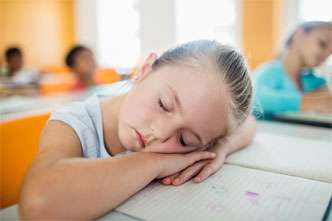Thyroid, Be Gone!
The thyroid is a little, butterfly-shaped (sort of) gland located at the front of the throat toward the base of the neck. However, for...
Posted on June 20, 2016
General
Sleep is essential for good health in children and adolescents. Our modern society emphasizes healthy nutrition, physical exercise and quality education for our children. However, is the same concern placed on how much time our children sleep? Surprisingly, no.
In many situations losing sleep to accomplish other goals is often worn as a “badge of honor.” It is not unusual to hear from my patients that “they pulled an all-nighter” to study for an exam or that they don’t sleep very much at night because they text with friends. Technology has become pervasive in our society and we seem to be consistently connected to our smartphones, tablets, computers, and televisions. Unfortunately, sleep is not a priority.
Any parent can recall the temper tantrums or bad behavior exhibited when their infant or toddler hasn’t slept enough. We tend to enforce better sleep behaviors when children are young, but lose this focus as our children age. The #1 reason people (including children) are tired is due to insufficient sleep time. This is the first question I ask when a parent brings their child for an evaluation of sleepiness or a sleep disorder.
This raises the question: how many hours of sleep does your child need?
This month’s issue of Journal of Clinical Sleep Medicine answers this question. For the first time, the American Academy of Sleep Medicine (AASM) has released official consensus recommendations for the amount of sleep needed to promote optimal health in children.
The recommendations in the consensus statement are as follows:
This may be a challenge for both children and their parents. Kids today are busy with homework, sports, school and extracurricular activities. This may require a change in parents as well as educators mindsets to prioritize sleep. Good habits are learned in childhood. Also, children learn by watching or modeling their parents’ behaviors. Thus, establishing good sleep habits early in life can translate to better health and performance in the long term. This study demonstrated that adequate sleep resulted in better mental and physical health as well as better performance at school and better relationships at home. Unfortunately, children who are sleep deprived have a greater risk of suffering mental and physical health problems. In addition, lack of sleep has been associated with tobacco, alcohol and illicit drug use and a higher risk of getting into car accidents.
Specific findings of the study include:
Lack of sleep is a public health concern for both children and adults. The good news is that sleep deprivation is completely treatable. Many parents and students will say that they are performing well or are high achievers despite lack of sleep. However, the truth is chronic lack of sleep is not good for your child’s long-term health and quality of life. If your child suffers from sleep issues, snoring, or fatigue you should contact your sleep physician.
The thyroid is a little, butterfly-shaped (sort of) gland located at the front of the throat toward the base of the neck. However, for...
Music can do wondrous things. It can evoke emotions, stimulate the imagination, support concentration, and importantly, fill awkward silences in conversation. If you’ve ever...
The fall and winter months are prime times during the year for flu and sinus infections. Five to twenty percent of the US population gets...
It could be said that some of the greatest joys in life are experienced through the sense of smell: the salty ocean, a rose,...